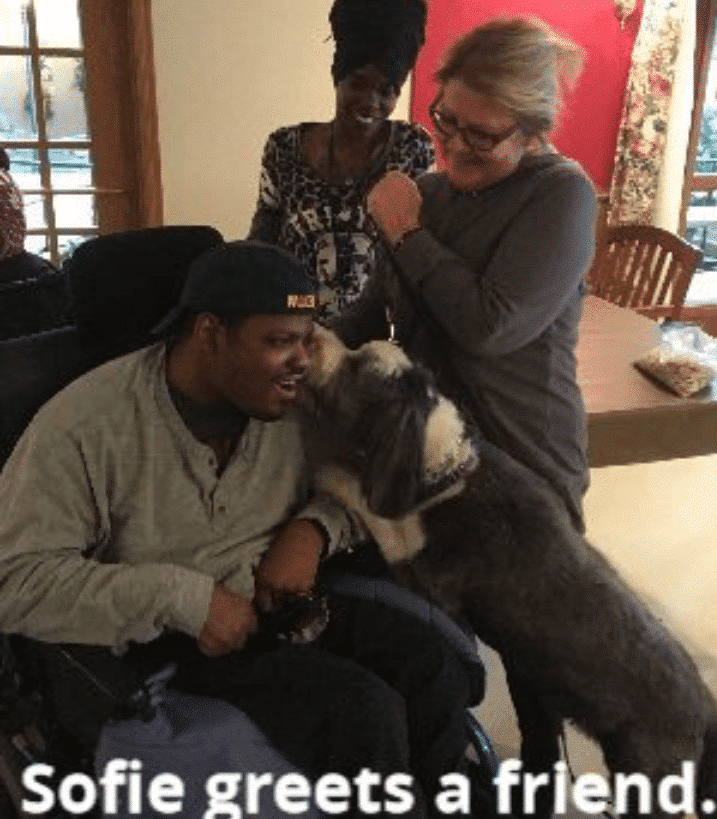You’ve probably heard about the health benefits owning a pet can provide, especially for seniors. From decreased stress to lower blood pressure and cholesterol, to improved socialization and more opportunities for exercise and socializing – the list is so impressive that it’s even been noted by the National Institutes of Health and the Centers for Disease Control and Prevention.
If you’re a pet owner, you’re already aware of the love and companionship a pet can provide. It may seem like a pet is a purr-fect solution for an older relative who’s been feeling lonely.
But before you suggest it, think honestly, not just about their willingness and ability to care for an animal, but also their own self-care capabilities. People over 65, and those with weakened immune systems, are more likely to get diseases spread between animals and people, so it’s imperative that they’ll remember to wash their hands after touching, feeding or cleaning up after the pets, and before eating or drinking.
How are their mobility and stability? Can they bend down to feed or clean up after a pet? Pets can increase risk of falling, especially of concern in Wisconsin, where even young and healthy people can be felled by icy sidewalks. A 2018 CDC report named our state as having the nation’s highest rate of deadly falls among the elderly. Some 1,365 residents 65 or older died from falls in 2016, for a rate more than twice as high the national average. That’s more than deaths from breast cancer and prostate cancer combined.
Nationally, a Journal of the American Medical Association study reported that bone fractures among seniors over 65 walking their dogs totaled 4,396 in 2017, more than double those reported in 2004. Inside, too, pets can get underfoot and cause falls.
There can be other hurdles as well. Money Under 30 places the cost of care for a healthy, medium-sized dog or cat is $500/year, not counting the costs in acquiring it. That can be tough on a fixed income – and some seniors will go hungry to make sure their pet eats. And sometimes a lease prohibits pets, or a family member’s allergies rule out keeping a pet.
There are ways, though, to get that love into their life, and it’s worth the extra effort! Perhaps you could suggest:
- Volunteering at local rescues. In the Milwaukee area, The Wisconsin Humane Society, Secondhand Purrs, Lucky Mutts Rescue, and others all offer various opportunities; check into physical and time commitment requirements.
- Cat cafes. You can make a reservation at Sip and Purr, a new cat café and lounge, to cuddle adoptable cats in their Cat Lounge ($5/hour). Or just watch them –no charge — through the glass as you snack in the adjoining café.
- Regular visits with and/or pet-sitting for a well-trained animal that belongs to friend or relative.
- If finances are the issue, caring for dogs or cats awaiting permanent adoption can be a good fit — many shelters pay for the pet’s vet care and food. Placements generally last a week to three months, and can be tailored to the carer’s needs – for instance, older and more sedate animals as opposed to an energetic puppy.
- Pet therapy house calls. Groups like the Alliance of Therapy Dogs and Therapy Dogs International bring trained service dogs to nursing homes, hospitals and hospices; some also offer home visits to bring comfort and healing.
Another Paws-ability
 If you’re considering adult day care for your relative, you can look for one that incorporates pets.
If you’re considering adult day care for your relative, you can look for one that incorporates pets.
Several comfort doggos spend time with clients at our Stein Campus (and two budgies chirp cheerfully in the atrium for an appreciative audience). Melody, a sociable golden retriever, is a regular in the dementia care unit, soothing anxious clients and cheering others; Sofie, a bearded collie owned by a client’s sister, visits the Northwest Unit weekly to interact. Comical little Spike pops in periodically to charm adult units and childcare classrooms with his Shih Tzu antics. And there’s Gracie, the English golden retriever who makes herself at home daily in the Senior Wellness Unit.
“Just seeing the clients’ face light up when Gracie walks in and greets them is wonderful,” says Debbie Pavlik, lead staffer in Senior Wellness. Even people who aren’t verbal brighten as Gracie nuzzles up and they reach to pet her. Some clients reminisce about dogs they’ve owned over the years, or bring in photos to share.
“Pets understand humans better than humans do,” Indian author Ruchi Prabhu once wrote. It’s worth digging a bit to help someone experience that understanding and unconditional love.
For more information about adult care services at the Stein Campus, 2801 E. Morgan Ave., contact Shannon Schave at (414) 977-5027; to learn more about the Bucyrus Campus, 2450 W. North Ave., contact Tiffany Payne at (414) 210-2460.
Learn more about Pets and Seniors:
http://www.marketwatch.com/story/5-reasons-seniors-should-consider-getting-a-pet-2019-04-03
http://www.aginginplace.org/seniors-and-pets/
http://newsinhealth.nih.gov/2018/02/power-pets
http://www.cdc.gov/healthypets/health-benefits/index.html
http://www.agingcare.com/articles/benefits-of-elderly-owning-pets-113294.htm
http://newoldage.blogs.nytimes.com/2012/03/30/rethinking-the-value-of-pets/
